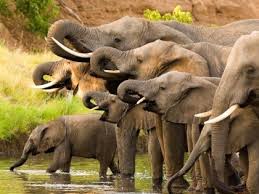Zimbabwe to Cull 200 Elephants to Combat Severe Hunger Amid Worst Drought in Decades
By Lokmat English Desk | Updated: September 19, 2024 13:32 IST2024-09-19T13:31:19+5:302024-09-19T13:32:03+5:30
Authorities in Zimbabwe have approved the culling of 200 elephants to address the severe food shortage caused by the ...

Zimbabwe to Cull 200 Elephants to Combat Severe Hunger Amid Worst Drought in Decades
Authorities in Zimbabwe have approved the culling of 200 elephants to address the severe food shortage caused by the country's worst drought in decades. Tinashe Farawo, spokesperson for the Zimbabwe Parks and Wildlife Authority, informed CNN that, with nearly half of the nation's population at risk of acute hunger, the plan is to target the culling of 200 elephants to help feed the affected citizens.
The decision comes in the wake of Namibia's recent action to cull elephants and other wildlife to combat food insecurity exacerbated by an extended drought. These measures have been met with criticism from animal rights advocates and conservationists.
According to Farawo, Zimbabwe's elephant population exceeds 84,000, nearly double its estimated sustainable capacity of 45,000, making it the second largest globally after Botswana. Last week, Environment Minister Sithembiso Nyoni informed Parliament that the country's elephant numbers surpass what the forests can support, leading to resource shortages and exacerbating human-wildlife conflicts.
"When wildlife overpopulates a park, they venture beyond it in search of resources like water or vegetation. This brings them into contact with humans, sparking conflicts," Nyoni explained.
In Namibia, the government has approved the culling of 700 wild animals, including elephants, to alleviate food shortages. To date, 150 animals have been culled, and over 125,000 pounds of meat have been distributed, according to Namibia's Ministry of Environment, Forestry, and Tourism. Both Zimbabwe and Namibia are experiencing severe droughts worsened by El Niño and climate change.